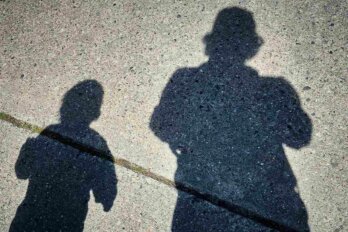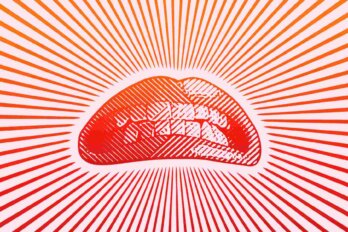The details remain clear. Bright hot day, the sun high in the sky and not a cloud to be seen. Class was over, and the yellow school bus home sang with the noisy clatter of children awaiting summer. I was let off. The house was locked, so I inserted my key and pushed open the creaky wooden door. And there he was, motionless and sprawled out on the cracked linoleum, his tube of painkiller pills and an empty glass clouded by the film of chocolate milk at his side. A note on the kitchen table read simply: Sorry. I can’t bear it anymore. Love you. On June 10, 1987, on my mother’s thirty-ninth birthday, my father had attempted suicide.
Mom was out, but I knew enough to phone 911, my hands shaking with fear. The ambulance arrived eight minutes later. Those eight minutes lasted forever. I knelt down beside him, pushed at his shoulders and arms, and tried talking to him. He came to, sort of. “How could you, Papa? ” I said. The effect of the pills had taken hold, and, while he tried to respond, I could make nothing of his answer. Soon, he was out again. I sat there. Where was Mom? Who was his note directed to? Did he love me? Why then . . . ?
I went to see Dad in the hospital two days later. Thank God, if such a thing exists, I thought. He had survived. There were tubes coursing in and out of his body, and from the open doorway I could see him looking somewhat dreamily out the window. He looked thin and frail as he reached for his glass of chocolate milk—I guess the hospital ceded to a request for his favourite drink. I noticed the deep scars on his hands from years of loading cargo and handling heavy ropes on ships travelling the broad St. Lawrence River. He turned, and I could tell that his eyes were still the same colour as the sea. He tried to smile, and then patted the bed. I said nothing, but my mind raced with a thousand questions. Why did you want to die? You don’t love me anymore? Why did I leave him alone? I should have known from the last time . . . . He took my hand in both of his. From a man who never said much, this, I suppose, was an apology. Again, I promised myself to never let him out of my sight. Like many deals made by ten-year-olds, it was unrealistic, but it was my deal nonetheless. Summer was upon us, and from that moment on I became Papa’s protector.
A week later Dad came home. The doctors had given him pills for depression, and, I thought, maybe they had turned his clear blue eyes cloudy. Day and night he slept, and Mom and I tried to keep each other company. Gone were the games of Nintendo he challenged me to, and gone too were the happy moments when he and Mom danced to “Stand By Me.” All that month and into the next, we ate a lot of spaghetti because Mom peeled onions—day after day after day—to hide the tears running down her face. Otherwise her face was blank, lifeless. When not sleeping, Dad went for walks down Rue de Lanaudière in Joliette, or fiddled with tools in the garage, or went to Canadian Tire. I followed him. Mom and I had an agreement, an unspoken one: she cried, I didn’t ask too many questions, one of us followed him.
My Dad first attempted suicide in the fall of 1985. I was eight, and we lived in an old house in Saint-Jean-de-Matha, a rural Quebec town of about 3,000 people where the local highlight was to get your name and birthday displayed on the town-hall bingo board. Both my mother and father came from large Québécois families—Mom one of thirteen children; Dad one of fifteen—but, with my Dad out of work, depressed, and a bit of a loner, neither of them was getting much support. One day, Dad had been loading cargo on a slippery boat deck. He’d fallen and wrecked his back in a way that two operations couldn’t fix. He’d been working on boats since he was fifteen, and he loved the life of the seas. It was all he knew, but as far as he was concerned, even if he had only a wife and a single child to support, a man who couldn’t work wasn’t a man. So, in 1985, while my mother and aunt were out clothes shopping for me, my father tried to kill himself by drinking Drano. My mother found him half-dead on the kitchen floor.
He survived, but for two months Dad came home only on weekends. The rest of the time he was at the hospital. We visited, but Mom and I spent a lot of time at home, alone.
One crisp December day, with the snow so white and shimmering that it hurt my eyes to look at it, I came home from school to find my aunts Janette and Janine, the twins, playing cards with my mother in the kitchen. Dad had finally returned home for good and was in the garage. I didn’t care much for these two aunts. They were tough and uncaring, and, knowing that “him” meant my father, I overheard one of them say to my Mom: “Ginette, please, just get rid of him. He’s sick, and he’s making you sick too. You have to divorce him! He’s made you lose so much weight that we can barely recognize you.” And I remember my mother replying, “I love him. Can’t you understand that, for God’s sake? I married him for the best and the worst . . . . He’ll get a new job, and everything will be like before.” I was so proud of her. Even if her sisters thought she was trapped by her love for my father, Mom still had hope.
I remember her telling me, “Francis, be a good boy with Papa. He has many headaches and he’s very sick.” My mother tried to hide the truth from me, but I heard my aunt Janine saying on the phone that my father tried to commit suicide. I didn’t know what this meant, but the dictionary told me—intentionally killing oneself—and I quickly learned that suicide was taboo in our culture.
I was glad when Dad finally came home to stay, and I tried to be as helpful as possible. I went to bed without whining or asking to stay up later. I shovelled the snow from the garage to the street. I had more As than Bs on my report card and I didn’t ask for expensive Christmas or birthday gifts. With Dad on welfare, we didn’t have much money. Still, it was hard to tell what he was sick of. For me, life was simple and great. A Mom, a Dad, Hot Wheels, Lego, and a house with a TV. My favourite shows were Fraggle Rock and The Littlest Hobo.
One night, Dad refused to build a snowman with me. It was nine o’clock, and he said I had school the next day. I told him, “Papa, I don’t love you anymore,” and went to bed. Those words came back to haunt me.
Maybe he left because I left too, because every night I sat alone and prayed. And just as I never told my father how Mom had stuck up for him against Janette and Janine, I never told him that I was praying that Mario of Super Mario Bros., my favourite video game, would chase away Dad’s demons and bring him back to us. I remember thinking, listening to my mother, that maybe moving wasn’t a bad idea, that maybe it would cure his depression, that maybe being away from all the relatives and old friends would help, but I never told my father that I did love him, that I was just a small boy wanting to build a snowman with his father, that I just wanted to be like other kids.
Three weeks after my Dad’s second suicide attempt—the one on June 10, 1987—we did move, to Joliette. The doctors, who, this time around, cut him loose early, had said that a change in environment might help. The main attraction in Joliette for young people was the parking lot at Dunkin’ Donuts. There wasn’t a whole lot to do, but the move was good for Mom. Mom and I never talked about it directly, but there was an understanding between us. She knew that I knew. I thought a lot about numbers back then, the five days of the week and the concept of threes. I went to school, came home, watched my Dad. Mom, I think, did and thought the same way. She watched my Dad, went shopping, made dinner.
That summer, as June rolled into July, we kept pretty much to ourselves. Then, one day in early August, my cousin Sylvie asked me to go to Toronto with her. She said we could go to the top of the tallest tower in the world, to Canada’s Wonderland, to see real mummies at the Royal Ontario Museum, anywhere I wanted to. Money was tight, but it was a seductive offer. I was excited, and Mom was excited for me. I thought maybe I could bring back a Toronto Maple Leafs jersey for Dad and that he would be pleased. I said yes. When I came back, four days later, my father was dead. He had hung himself on the tallest tree in the woods near Joliette. He had told my mother that he was going to pick some blackberries so that she could bake a pie.
I don’t remember the Toronto trip very well, but I do remember thinking until just last year that if I hadn’t gone we would still have a life of three. After Papa died, it was just Mom and me, a life of two. It would have been different, no doubt, if there had been siblings. It might have helped in some ways, but it is also hard to keep secrets, to keep things quiet, with large groups of people. I stopped talking about Papa and never cried in front of Mom. We were two, but our sorrows tunnelled underground, secretive and private. I wanted her—needed her—to be proud of me, and while she wanted me to talk about it, I wouldn’t. So during my teenage years, I settled for a world inside my own head. Things were safe there, away from the bullying, finger-pointing, and laughing behind my back. My Papa had committed suicide, and the outside world is cruel. I was never the kind of kid to get involved in rugby or football at school, and during those years I watched The Simpsons, listened to U2 in my bedroom, and read quite a bit. I spent a lot of time alone in my bedroom, reading and writing stories. One of my favourite books was Sartre’s No Exit, and this made sense because outside of my mother, hell was other people.
On August 7, 1987, Papa committed suicide. Obviously, he felt that he had to leave, and perhaps he did it for us. Still, I have been sad and angry and hurt for a very long time. Things are a bit better now, and, as I have discovered, if you need to tame a monster, writing helps. There is nothing quite like controlling character.




